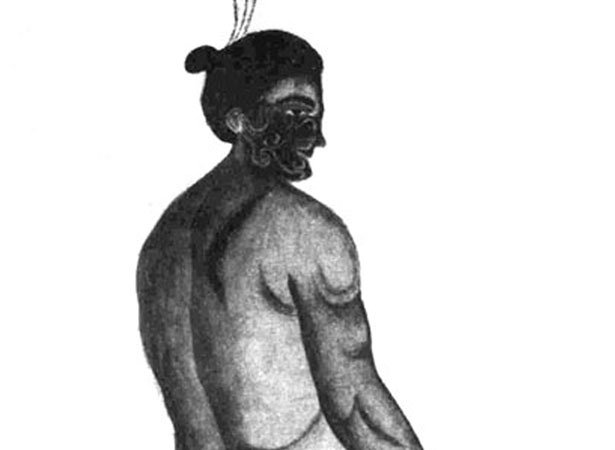
Ranginui was a Ngāti Kahu chief from Doubtless Bay who was kidnapped by the French explorer Jean François Marie de Surville.
De Surville’s ship, the St Jean Baptiste, had left French India in early June 1769 on a voyage in search of trading opportunities in the Pacific. After sailing around the north of the Philippine islands group and then south-east to the Solomons, de Surville decided to sail due south in the hope of making landfall on the island whose coast Abel Tasman had charted 127 years earlier. His crew were suffering badly from scurvy and the ship was running out of water.
On 12 December the ship’s lookout sighted the west coast of Northland. The vessel rounded North Cape in a storm on 17 December, unaware that James Cook’s Endeavour was nearby, sailing in the opposite direction. The French expedition then spent two weeks in Doubtless Bay, resting and recuperating.
De Surville initially respected Māori customs and relations were mostly friendly. Ngāti Kahu supplied the French with vegetables in return for European foodstuffs and cloth. The ship’s officers recorded valuable impressions of Māori customs and artefacts in their journals. The ship’s chaplain probably presided over New Zealand’s first Christmas Day service.
Later, the atmosphere soured. When Māori took a small boat that had drifted ashore, de Surville captured Ranginui, who had been hospitable towards the visitors, and ordered the destruction of whare and other property.
De Surville forced Ranginui aboard the St Jean Baptiste and then set sail east across the Pacific. With no land sighted, sickness spread amongst the crew once more, and Ranginui died of scurvy on 24 March 1770.
Margaret Mutu (Ngāti Kahu, Te Rarawa, Ngāti Whātua), Professor of Māori Studies at the University of Auckland, offered a mana whenua perspective on this incident in 2019. ‘We have never received an apology for this act of treachery. We did not support a plaque honouring the memory of De Surville. We honour the memory of the Rangatira Ranginui, not only in Haititaimarangai marae at Whatuwhiwhi, but also at Kēnana marae to the south of present day Mangōnui, where the wharenui is named after him.’¹
How to cite this page
'Kidnapped Ngāti Kahu chief Ranginui dies on French ship ', URL: https://nzhistory.govt.nz/maori-kidnap-victim-dies-french-ship, (Ministry for Culture and Heritage), updated 1-Nov-2023
